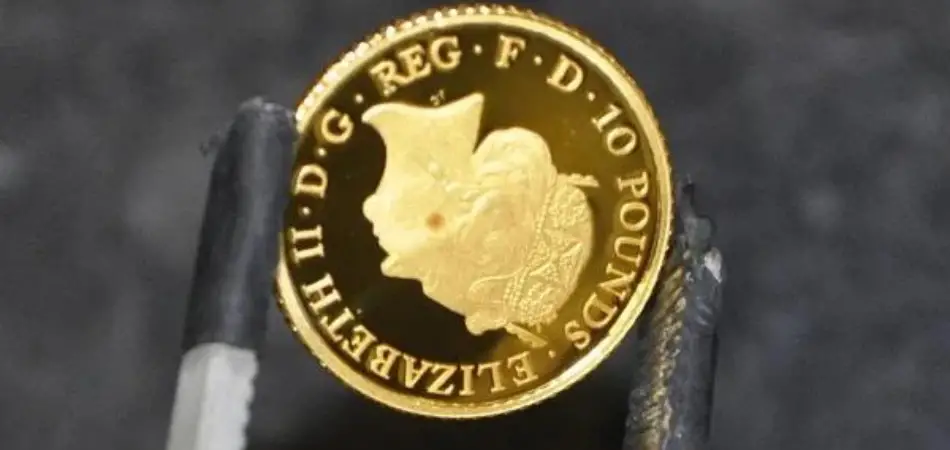Perhaps you have heard gold referred to as a “noble metal.” The layman would think that this means gold signifies nobility and high class. It is not wrong in a sense, but there is more to why this precious metal is referred to as a noble metal. However, does gold rust?
No, gold does not rust. Gold is an element that, in its natural form, does not oxidize and therefore will not rust. Gold is one of the least reactive chemical elements, making it stable in air and water and resistant to corrosion.
Also, Gold is formed and never rust, even in the long run. Given that gold is a metal, it is hard to believe that the color does not fade or change when exposed to different weather conditions. It shows no effect in its appearance or structure when left in the open air for long periods, so it does not rust.
If you desire to know more about the properties of gold, why it will not rust like every other metal, and how you can easily protect and prevent rust, keep reading.
Contents
Why Does Gold Not Rust or Tarnish?
Rusting or tarnishing are corrosive situations and you should know that gold does not give in to any of these corrosive states. This is because of the physical and chemical properties that make it a noble metal. This simply means that this precious metal does not react naturally to things that trigger these corrosive states.

If you would get gold to rust or tarnish, then you would have to bypass natural laws to do this. The use of Aqua regia is one way some people go about this. But as stressed earlier, gold will not give in to rusting or tarnishing naturally.
But even at that, there are clear signs of rusting or tarnishing in some gold items and this does not prove that the explanations above are untrue. You should keep reading to understand why such can happen to some gold items.
Why Do Some Gold Items Get Rust or Tarnish?
Gold as a sole metal cannot get rust or tarnish. However, you might have noticed that some gold items appear to be rust or tarnish. Here are some of the possible reasons for this:
Having 100% Pure Gold Item Is Impossible
You might have heard gold sellers claim that their gold items are pure gold. If by pure gold they mean that it is 100% gold and nothing else, then this is a lie. The reason is that gold cannot form an item without the use of another metal, no matter how little.

The purest gold item is what is known as 24 karats and a very little bit of metal (other than gold) is used. While gold is not reactive to the situations that can trigger rust and tarnishing, the other metal could be.
Metals such as copper and zinc are commonly used alongside this noble metal but they do not share the same status in this regard. Options like copper and zinc are known as base metals and can give in to various forms of corrosion.
If you see a gold item that is showing signs of rust or tarnishing, then it is because of the unresisting nature of these other metals to corrosion at large. The chances of these happening are even more likely if the other metals make up a larger percentage of the gold alloy.
This is why items that are 24 karat gold are less likely to experience this. The same cannot be said about items that fall under the 14 karat category and less. Even options up to the 18 karat category are still susceptible.
Gold Is Not without Its Setback
Gold is a noble metal and offers a lot. However, there is a reason it cannot be used in its purest of forms – without the aid of another metal. This is because it is very soft.

As a result, it does not offer durability if used on its own. This is even why 24 karat items are the gold items that are least durable. This is despite how expensive they are.
It is, for this reason, that base metals that are susceptible to rusting have to be used to harden these gold items. This informs the use of metals such as silver, zinc, copper, platinum, and the likes for this purpose.
Lapses during Production
The lovely-looking gold item that you see has gone through a lot from the refiner’s. You should also know that these professionals need to keep their working area as sterile as possible. This is so that the manufactured gold is not contaminated with another metal.
Lapses can occur during production if the minting equipment is not properly cleaned. This is more likely when demand is high and the refiners are doing a lot to meet the target. They might forget or ignore the need to keep their environment and equipment sterile.
Further, this can cause some unneeded base metal to find its way into what should be considered high-quality gold. The presence of such unwanted metal can cause rust or tarnish in the long run. It is for this reason some people are very particular about where the gold was made.
Gold Coated Items
The definition of a gold item is subjective. For instance, anything below 10 karats is below the benchmark for gold jewelry in the United States. Even at that, most jewelry is 3 karats above this limit. The situation is different in places like Germany, Greece, and Denmark that have the limit set at 8 karats.
In the same vein, some people consider items that are gold-coated as gold items. Well, such items can eventually end up rusting or tarnishing. This is if the gold coat scratches off as this is possible.
Conclusion
You now understand at this point that gold in its natural form cannot rust or tarnish. However, items made using gold can show these signs for several reasons listed and explained above. The best way to avoid this situation is to get gold items that have more gold used in the gold alloy.
In addition to these, the other metals should stand a better chance against these corrosive situations. You should also keep and handle these gold items properly.

